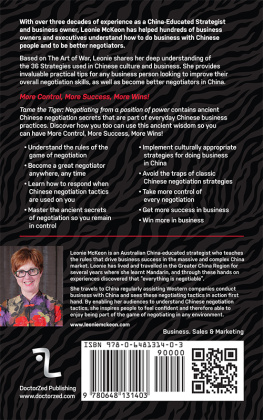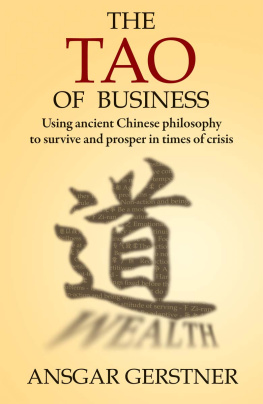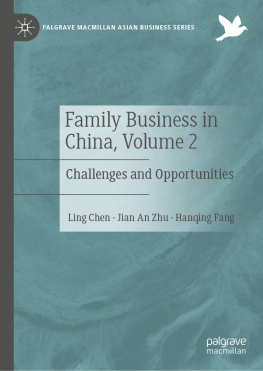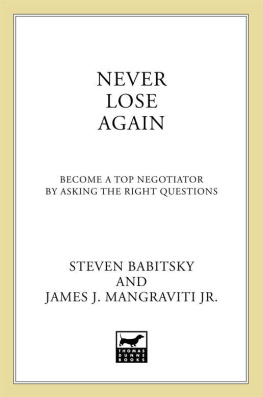Tame the Tiger
Tame the Tiger
Negotiating from a position of power
Leonie McKeon
Copyright 2017 by Leonie McKeon
All rights reserved. No part of this book may be used or reproduced by any means, graphic, electronic, or mechanical, including photocopying, recording, taping or by any information storage retrieval system without the written permission of the publisher except in the case of brief quotations embodied in critical articles and reviews.
Books may be ordered through booksellers or by contacting: www.leoniemckeon.com
ISBN: 978-0-6481314-0-3 (sc)
ISBN: 978-0-6481314-1-0 (ebk)
A CiP number for this title can be found at the National Library of Australia.
Cover image Trish Pollock
Because of the dynamic nature of the Internet, any web addresses or links contained in this book may have changed since publication and may no longer be valid. The views expressed in this work are solely those of the author. The author does not dispense financial advice or prescribe the use of any technique as a form of guarantee for financial or business viability without the advice of a qualified financial advisor, either directly or indirectly. The intent of the author is only to offer information of a general nature to help you in your business. In the event you use any of the information in this book for yourself or your business, which is your constitutional right, the author and the publisher assume no responsibility for your actions.
Printed in Australia, UK and USA.
rev. date 08/08/2017
Acknowledgements
W hen I started writing The Dao of Negotiation, I realised that although I am a Chinese expert, authoring a book required new skills. I would like to thank Nicole Turner for teaching me how to write a book. I would like to thank Jennifer McKeon who read and re-read the drafts so many times she might now be a 36 Chinese Strategies expert too. In particular I want to thank Shelley Rogers who encouraged and supported me to write The Dao of Negotiation. She also challenged me with essential questions like how and why, and moved sentences around so my words made much more sense. And finally many thanks to Michaela Crisp for her wonderful research skills, and to everyone else behind the scenes who have made this book happen.
Appear weak when you are strong,
And strong when you are weak.
Sun Tzu, The Art of War
Leonies Journey
M y friend and I had been backpacking around the world for a year and a half when we started to run out of money. Luckily, we had just enough to buy a cheap airfare to Hong Kong where we thought there would be no difficulty getting a job. The plan was to replenish our funds and continue our journey. I managed to get only one interview, which was as a topless barmaid. The owner of the bar decided that I had neither the personality nor the body to be serving drinks in a Gstring.
My travelling companion was sitting in the foyer of the club waiting for me while the owner conducted the interview. She asked me what I thought my friend could do, and without thinking I said he could be a bouncer at her club. She looked him over; although he stood more than six feet tall, he had lost so much weight in India his eyes were sunken. She advised us Hong Kong was no place for people of our ages with little money. I had just celebrated my 26th birthday in India, and despite feeling mature we were sent on our way feeling disappointed and rejected. On reflection, she had given us an excellent piece of advice.
That night we returned to our cheap, unhygienic hostel where we met an English backpacker in the corridor. He suggested we go to Taiwan and teach English, explaining that he had lived there for a year and left with a pocket full of money. I asked him where Taiwan was, demonstrating how little I knew about the geography of the region.
Off we went to Taiwan with no teaching experience and no more understanding of Chinese culture than we had gained at our favourite Chinese restaurant in Melbourne. I spent the next five years living in Taiwan, where I developed skills in English teaching that I would never have believed possible. During my first year, in order to get a job, I had to pretend I was American, because English schools in Taiwan only employed people from the United States of America and the Taiwanese wanted to learn to speak English with an American accent. Most places only accepted university graduates so I instantly became a university graduate, while the truth was I had only completed high school.
After five years of living in Taiwan, learning to speak Mandarin and to read traditional Chinese characters, I travelled through China for a year before returning to Australia to study, completing a bachelors degree in Anthropology and a Graduate Diploma in Business Enterprise. On completion of my studies, I opened my own business Chinese Language and Cultural Advice, which provided cultural awareness and Mandarin language training to Australian businesses wanting to get into the Chinese market. I operated that business for fifteen years. In 2013, I sold the business, and I now work for several businesses as a China Strategist, designing and implementing their China strategy. I am also a conference speaker and a presenter delivering workshops on the 36 Chinese Strategies derived from The Art of War.
The Missing Piece
In Taiwan I studied Mandarin and learned to read, write and speak the language. Even though I lived in Taiwan, where I immersed myself as much as possible in Chinese culture and became competent in Mandarin, I still had the feeling there was a piece of information missing. There were gaps in my understanding of what was happening within my interactions in workplaces, negotiating purchases and communicating with my Chinese friends. Several years later, I discovered that the crucial piece missing in my knowledge was the understanding of the 36 Chinese Strategies.
These 36 Chinese Strategies are a set of ancient idioms derived from The Art of War. Many people are familiar with The Art of War, which is an ancient Chinese military text dating from the 5th century BC. Supposedly written by the ancient Chinese military strategist known as Sun Tzu. The Art of War is considered a definitive work on military strategy and tactics and has had an influence on Eastern and Western military thinking, business tactics, legal strategy and more. The 36 Chinese Strategies are thought to have originated as colloquial sayings that may have developed through similar sources to The Art of War. What is relevant is that in our contemporary world they are used daily in negotiation and communication interactions by most Chinese people.
Fifteen years ago when I was only a couple of years into my first Chinese-based business and on one of my regular trips to Shanghai, I was introduced to the 36 Chinese Strategies for the first time by a man whom I met at a networking function. It was one of those chance meetings when someone passes through your life, and however brief the encounter, it has the power to change your view of the world. He invited me for coffee. At that time Starbucks was a popular meeting place for Westerners, being one of the few places in Shanghai to sell drinkable coffee. Like me, he had lived in the Greater China Region for many years and was very competent in Mandarin.
Meeting him was a real adrenalin rush, because it is rare even now that I encounter someone with a level of knowledge of Mandarin and everyday Chinese culture comparable to my own. All those years ago it was quite overwhelming. This knowledge of Mandarin gave each of us a shared understanding of the others experience with Chinese culture. We talked about how understanding Mandarin was one of the essential keys to comprehending Chinese culture. Our discussion revolved around the fact that Chinese people usually communicate indirectly, and how these different communication styles are imbedded, through the language, in Chinese peoples behaviour. He then mentioned the importance of understanding the 36 Chinese Strategies and from that point, I knew I was about to embark on an incredible journey into knowledge that would expand the way I understood how Chinese people think, behave and negotiate.
Next page










